
Cat Coughing: Causes and Remedies
When a cat exhibits coughing, it may raise concern for cat parents. Coughing in cats can be caused by a variety of factors, ranging from minor irritants to more serious health conditions. Understanding the nature of these coughs is vital, as they can serve as an indicator of the cat’s overall health. For instance, a cough may result from something as simple as a tickle in the cat’s throat due to a bit of dust or as complex as an underlying respiratory condition needing medical attention.
In determining why a cat is coughing, it’s important to observe the frequency, duration, and nature of the cough. Occasional coughing might not be alarming, but persistent or severe coughing requires veterinary assessment. Health care professionals can offer diagnostic procedures to identify the cause of the cough, ensuring proper treatment. Appropriate care, prevention strategies, and monitoring at home play a crucial role in managing the health of a coughing cat, contributing to their well-being and quality of life.
Key Takeaways
- Coughing in cats can be triggered by various reasons from simple irritants to serious health issues.
- Persistent coughing in a cat necessitates veterinary evaluation for proper diagnosis and treatment.
- Ongoing management and preventive care are essential for maintaining the health of a cat with a cough.
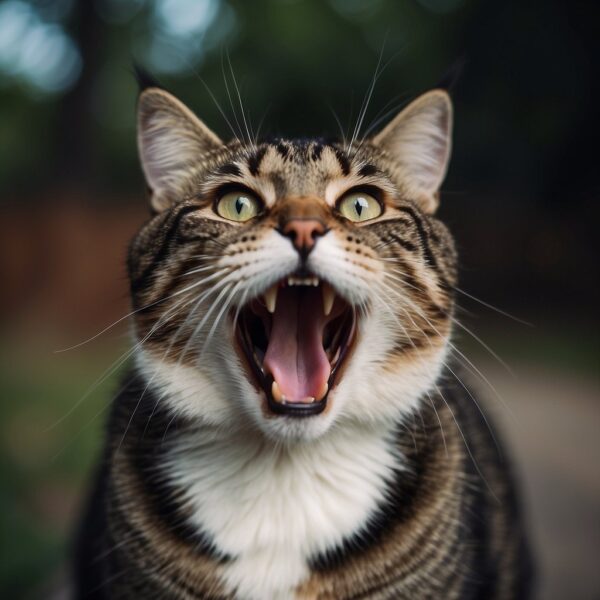
Understanding Coughing in Cats
Coughing in cats is a symptom that can signify various underlying issues, ranging from minor irritations to severe health conditions. Early recognition and understanding of coughing in cats are paramount for timely intervention and treatment.
Common Causes of Coughing in Cats
- Upper Respiratory Infections: Often caused by viruses like feline herpesvirus and feline calicivirus.
- Asthma: A common condition leading to coughing, especially in young and middle-aged cats.
- Foreign Bodies: Inhaled objects can lodge in the airways, causing persistent cough.
- Parasites: Heartworms and lungworms can lead to respiratory symptoms, including cough.
- Heart Disease: In some cases, coughing is a secondary symptom of heart conditions.
- Tumors: Both benign and malignant growths in the respiratory tract can cause coughing.
Symptoms and Diagnosis
Cats exhibiting coughing may show other signs such as wheezing, breathlessness, and gagging. Coughing up blood is a particularly serious symptom that demands urgent veterinary attention. Diagnostic tests for coughing cats typically include:
- Physical Examination
- Chest X-rays
- Complete Blood Count (CBC)
- Heartworm Tests
- Endoscopy
When to Consult a Veterinarian
Immediate veterinary consultation is advised if a cat:
- Coughs persistently over several days
- Displays difficulty breathing
- Coughs up blood
Timely professional evaluation can make a significant difference in the outcome for coughing cats, ensuring prompt and appropriate treatment.
Potential Diseases and Conditions
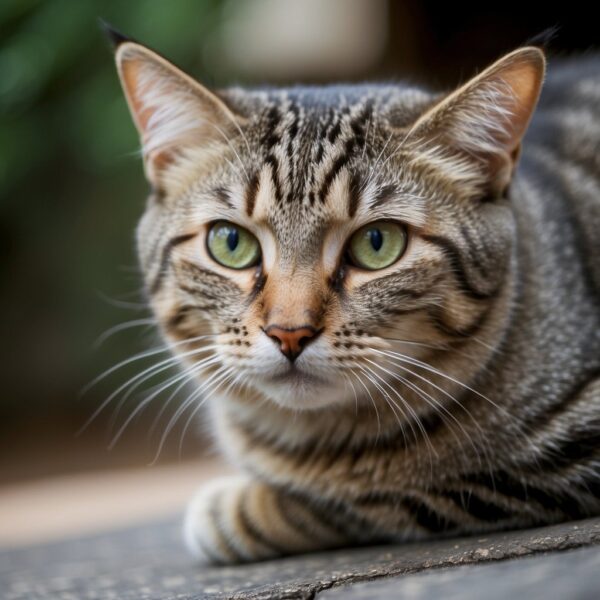
When a cat coughs, it can be a sign of various diseases and conditions ranging from mild to serious. Identifying the underlying cause is crucial for the proper treatment and management of the cat’s health.
Upper Respiratory Infections
Upper respiratory infections (URIs) are common in cats and often caused by viruses or bacteria. Symptoms can include coughing, nasal discharge, and sneezing. Feline herpesvirus and calicivirus are typical viral causes, while bacterial infections may involve organisms such as Bordetella bronchiseptica.
Feline Asthma
Feline asthma is a chronic inflammatory disease of the airways, closely resembling human asthma. Affected cats may exhibit wheezing, labored breathing, and coughing. Allergens in the environment often trigger asthma attacks.
Parasitic Infections
Cats may cough due to parasitic infections such as lungworms or heartworms. Aelurostrongylus abstrusus is a common lungworm in cats, whereas heartworm disease is caused by Dirofilaria immitis. Both can lead to severe respiratory problems.
Heart and Lung Conditions
Serious conditions affecting the heart and lungs such as heart disease, heart failure, and lung cancer can manifest as coughing in felines. Heart disease can lead to congestive heart failure, causing fluid accumulation in or around the lungs, resulting in coughing. Lung cancer may also present with cough as the disease progresses.
Allergies and Environmental Factors
Cats, like humans, can be allergic to a variety of environmental factors including pollen, dust, smoke, and certain chemicals. In response to these allergens, a cat may cough as part of an allergic reaction, which may also be accompanied by itchy skin and watery eyes.
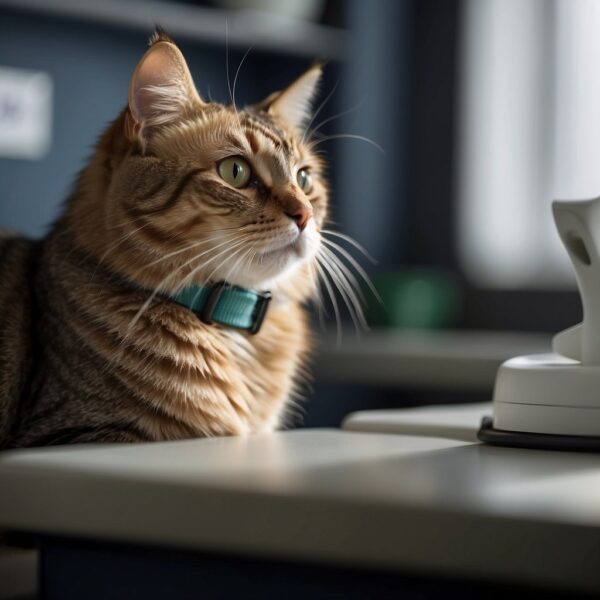
why is my cat coughing? Diagnostic Procedures
To determine the cause of a cat’s cough, veterinarians follow a methodical approach involving various diagnostic procedures. These procedures often begin with a thorough physical examination and may be followed by more detailed imaging tests and laboratory tests to pinpoint the underlying issue.
Physical Examination
A veterinarian will start with a close inspection of the cat’s overall physical condition. Key observations include listening to the lungs and heart with a stethoscope and checking for any signs of respiratory distress or other illness.
Imaging Tests
Imaging tests provide internal views that are crucial for diagnosis:
- X-Rays: Thoracic x-rays are commonly used to assess the lungs, heart, and chest cavity for any abnormalities like bronchial patterns or masses.
- Ultrasound: This non-invasive test can offer a more detailed look at the cat’s internal organs and may detect fluid around the lungs or heart, which x-rays can miss.
Laboratory Tests
Blood tests and other forms of lab work assist in the diagnosis. They can reveal:
- Blood Tests: These analyze white and red blood cell counts, which can indicate infection or inflammation.
- Other Lab Tests: Samples from airway secretions might be taken to check for bacteria, parasites, or other pathogens.

Treatment Options
When a cat presents with coughing, it is imperative to diagnose the underlying cause accurately to administer an effective treatment regimen. Treatment options may include medications and supplements, surgical interventions, or supportive and holistic care, each addressing specific aspects of the condition.
Medications and Supplements
Antibiotics: If the cough is due to a bacterial infection, a veterinarian may prescribe antibiotics. The duration of treatment can vary, with some conditions requiring up to 42 days for resolution.
Steroids: These are used to reduce inflammation, especially in cases where an allergic response is the cause of the cough.
- Heartworm Prevention: For coughs related to heartworm disease, heartworm prevention medication is essential.
- Cough Suppressants: May occasionally be used, but usually under careful veterinary guidance as they may mask important clinical signs.
Surgical and Emergency Procedures
Surgery: In cases of tracheal obstruction or tumors like adenocarcinoma, surgical removal may be the treatment of choice, provided the cat is a suitable candidate and the condition is localized.
- Emergency Interventions: For severe and acute conditions leading to cough, such as certain foreign bodies, emergency surgery might be necessary to remove the obstruction and alleviate the cough.
Supportive and Holistic Care
Supportive Care: For chronic conditions, maintaining a stress-free environment and good nutrition can help manage symptoms. Nebulization and air humidifiers can also assist in easing respiratory discomfort.
- Holistic Approaches: Some pet owners opt for holistic treatments in tandem with traditional medicine to support overall well-being, although these should never replace primary veterinary care.
Preventative Measures and Management
To protect a cat’s health and manage coughing, pet owners can implement several strategies. These include minimizing exposure to common irritants, ensuring a healthy diet, and maintaining routine veterinary checkups.
Environmental Modifications
Modifying the cat’s environment helps reduce exposure to potential triggers such as smoke, allergens, and other irritants. Owners should:
- Avoid smoking around the cat and ensure a smoke-free living area.
- Use air purifiers to reduce airborne allergens.
- Minimize the use of sprays, fragrances, and other substances that can irritate a cat’s respiratory system.
- Create a stress-free environment as stress can exacerbate respiratory issues.
Dietary Considerations
A proper diet plays a crucial role in maintaining a cat’s ideal weight and overall health, which influences respiratory function. Considerations include:
- Providing measured meals to prevent obesity, a factor that can increase the likelihood of respiratory problems.
- Incorporate a balanced diet that is tailored to the cat’s age, weight, and health condition.
Regular Veterinary Care
Routine veterinary visits are vital for early detection and management of health issues that may cause coughing. Key aspects involve:
- Scheduling regular check-ups for preventive care and vaccination updates.
- Discussing the appropriate exercise regimen with a veterinarian to support lung and heart health.
- Monitoring the cat’s health for early intervention if cough-related symptoms arise.
By focusing on these preventative measures, pet owners can help safeguard their cat’s health and reduce the occurrence of respiratory issues.
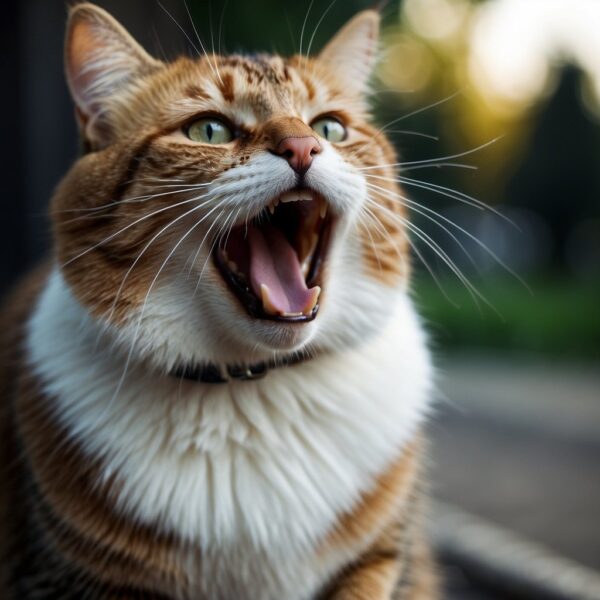
Home Care and Monitoring
When a cat displays symptoms such as coughing, whether it’s a wet or dry cough, sneezing, retching, gagging, wheezing, difficulty breathing, open-mouth breathing, or decreased appetite, cat parents must monitor these signs diligently. Home care for a coughing cat requires a careful approach to ensure the cat’s comfort and to determine if there’s a need for veterinary intervention.
Critical signs such as open-mouth breathing or severe congestion warrant immediate veterinary attention, as these can signal an emergency.
| Symptom | Action Required |
|---|---|
| Wet/Dry Cough | Observe frequency; note any discharge |
| Sneezing | Check for allergens; limit irritant exposure |
| Retching/Vomiting | Remove food temporarily; ensure hydration |
| Wheezing | Minimize stress; keep the air clean |
| Difficulty Breathing | Seek emergency care |
| Congestion | Use a humidifier to ease breathing |
| Decreased Appetite | Monitor closely; if persistent, consult vet |
Cat parents should keep a log of symptoms and their frequency. They may consider using a computerized cough monitoring system if advised by their vet, enabling accurate tracking of cough patterns and severity over time.
If a cat has recently been discharged from a veterinary clinic, follow the discharge instructions meticulously, and ensure the continuity of any prescribed treatments. Keep the environment stress-free and clear of respiratory irritants like smoke, dust, or strong fragrances, as they can exacerbate the condition.
Remember, while mild coughing can sometimes be managed at home, persistent or severe symptoms need veterinary evaluation to rule out serious health issues.
Understanding the Impact on Pet Health
When a cat coughs, it often indicates an issue within the respiratory tract which includes the nose, throat, trachea, and bronchi. In cats, coughing is a notable sign that should not be overlooked as it often suggests that their ability to breathe may be compromised in some way.
Airway Irritation:
Various factors, such as allergens or irritants, can cause inflammation in the larynx or lower airways. This irritation can lead to coughing as the body attempts to clear the trachea and bronchi from the offending particles.
Inflammation and Edema:
Inflammation within the airways can result from infections, allergic reactions, or inhalation of foreign bodies. This inflammation can lead to edema (swelling), further narrowing the air passages and complicating the breathing process.
- Common Signs:
- Persistent cough
- Difficulty breathing (dyspnea)
- Wheezing or gagging
- Reduced exercise tolerance
An affected cat may exhibit cough with an audible wheezing, indicating a disturbed airflow due to narrowed or obstructed respiratory passages.
Infection:
Infectious agents like viruses, bacteria, or fungi can directly damage the lining of the respiratory tract, causing phlegm production and cough as the system tries to clear the accumulation.
Secondary Conditions:
Issues such as pleural effusion, which is the accumulation of fluid in the chest cavity, can exert pressure on the lungs and impede normal respiratory function, leading to coughing and distress.
It is essential for owners to monitor their cats for these signs and seek veterinary evaluation to identify the underlying cause and appropriate treatment to safeguard their cat’s health.
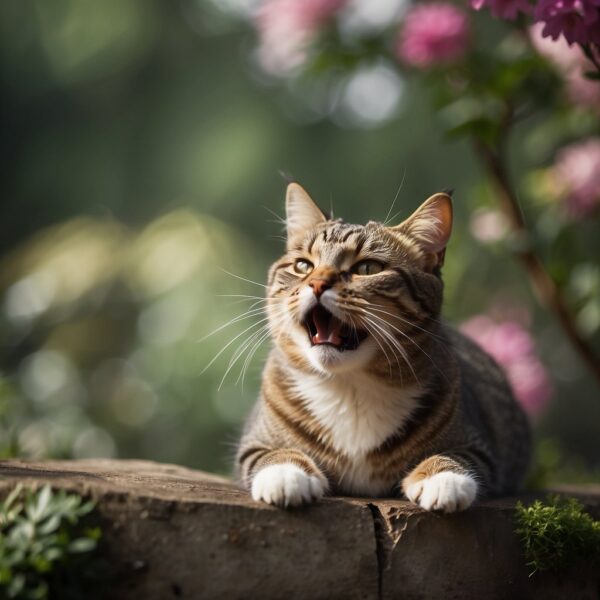
Frequently Asked Questions
Coughing in cats can be symptomatic of various underlying issues, ranging from the common hairball to more serious respiratory conditions. It is an act of expelling air from the lungs suddenly through the windpipe that is characterized by a harsh, hacking sound. Understanding these nuances can help cat owners identify when a cough is harmless and when it might be a sign of something that necessitates veterinary attention.
What can cause a cat to cough apart from hairballs?
Several conditions can cause a cat to cough other than hairballs, including asthma, bronchitis, respiratory infections, heartworm disease, and lung parasites. Environmental irritants like smoke or dust can also trigger coughing.
What home remedies are safe for a cat with a cough?
Home remedies should be approached with caution, and it is always recommended to consult a veterinarian first. That said, ensuring the cat remains hydrated, providing a humid environment, and eliminating potential irritants from the air can help alleviate coughing. It’s crucial, however, to avoid human medications unless prescribed by a vet.
How can I tell if my cat’s cough is due to mucus?
A wet or phlegmy sound during coughing can indicate mucus buildup in the airway. Additionally, if a cat is swallowing frequently or appears to be trying to clear its throat, this can also be a sign that mucus is present.
Is it normal for a cat to cough more during nighttime?
Coughing more at night can indicate asthma or other respiratory conditions that are exacerbated by lying down. However, it’s not typically ‘normal’ for a cat to cough more at nighttime, and this symptom should be discussed with a vet.
What are the possible reasons for a cat coughing and sneezing frequently?
Coughing and sneezing frequently could be signs of a respiratory infection, allergies, or a viral disease such as feline herpesvirus. Continuous symptoms like these warrant a thorough check-up by a veterinarian.
Should I be concerned if my cat is coughing, gagging, and wheezing?
Coughing, gagging, and wheezing are symptoms that can be associated with serious conditions such as asthma, heart disease, or even foreign bodies stuck in the throat. Any combination of these symptoms should be promptly evaluated by a vet.